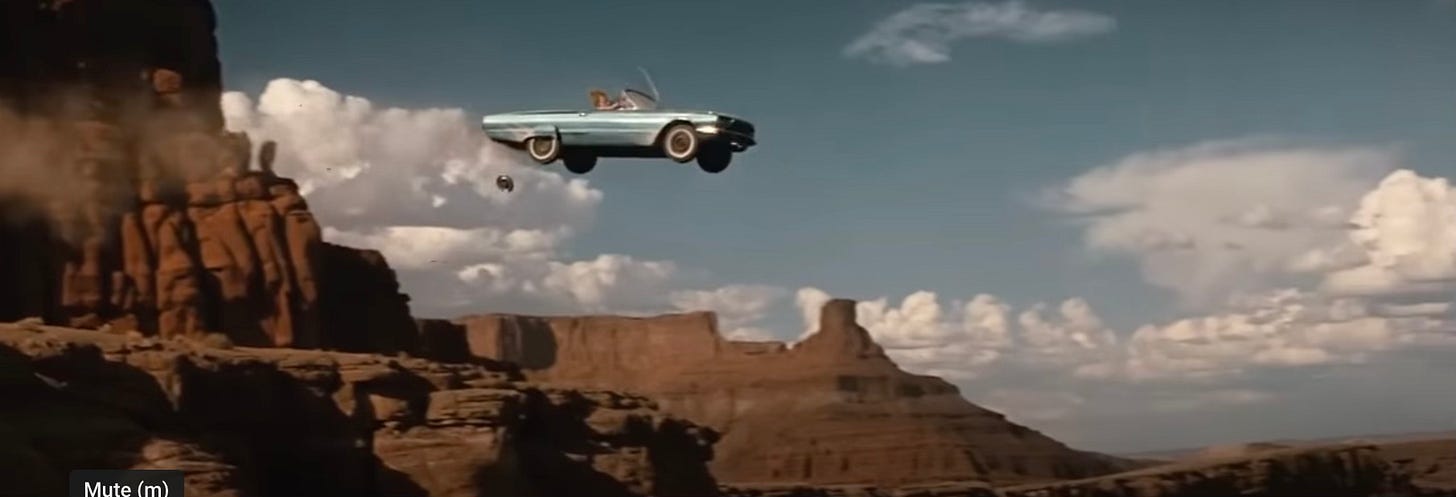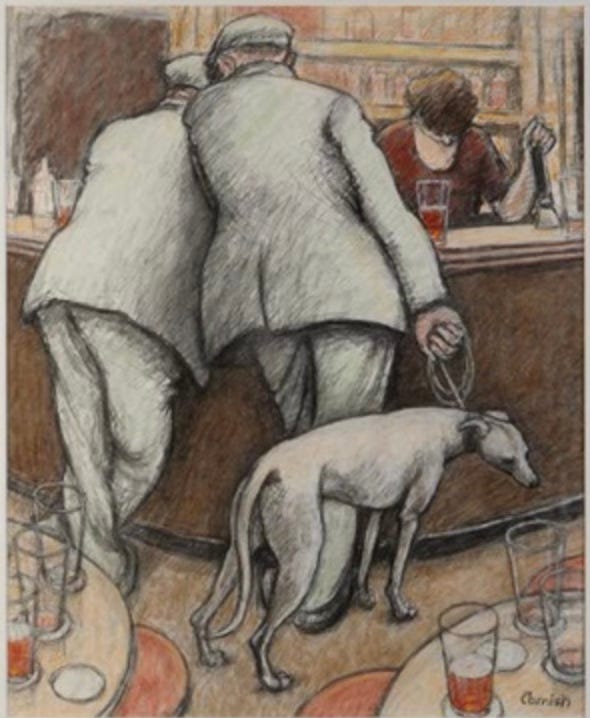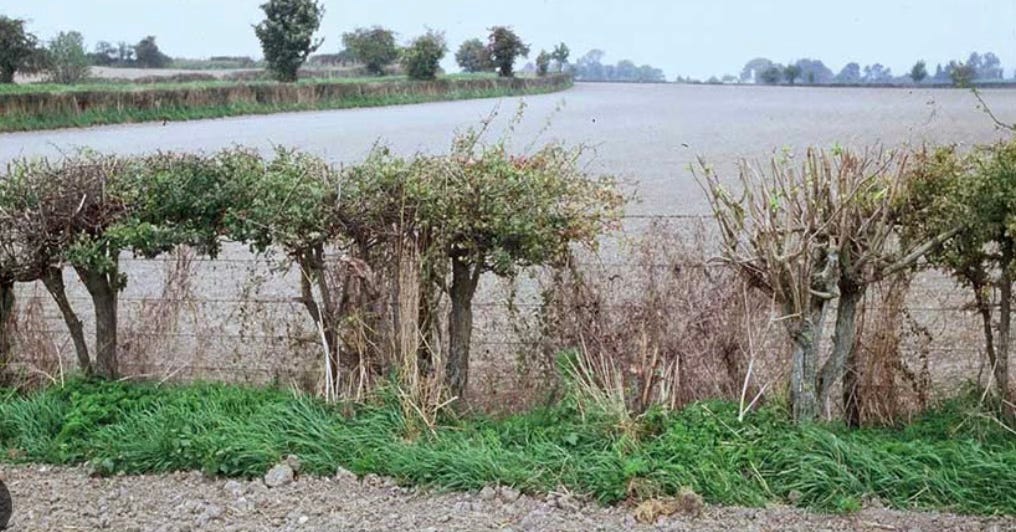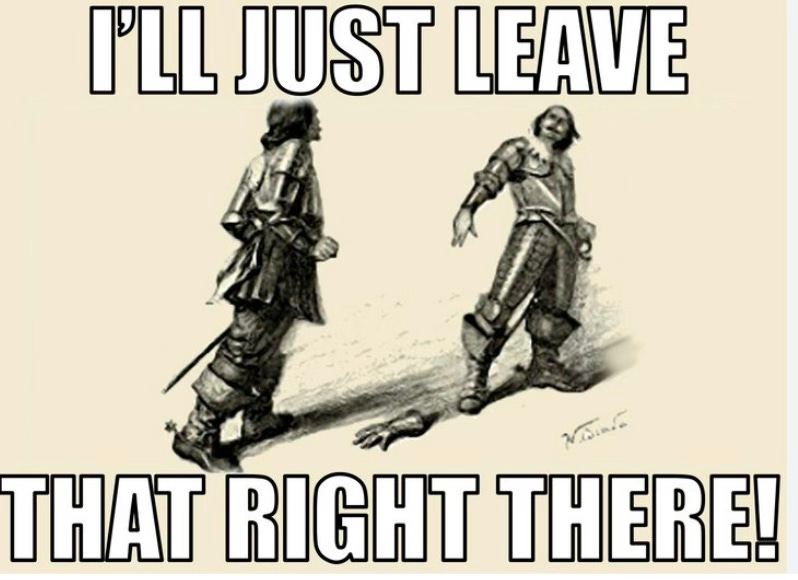Right Wing and Green: Star-crossed Lovers
Just as the Right recover their inner Hobbit and begin to talk Restoration with the Ents, the Greens go all Orc-ish
Here’s a thing. A couple of years ago, whilst simultaneously yelling at anyone who’d listen that climate change was an EXISTENTIAAAAAL THREEEEEAAAAT to humanity, and that anyone who diverted attention from this singular crisis was selfish or stupid or both, the Canadian Green Party lost it’s entire front bench in a scandal about …..wait for it…. misgendering and pronouns.
The same year, it banned Catholic candidates on account of their pro-life views. So it turns out that the existential threat to the biosphere is the most important thing in the world except for the existential threats to transgender pronouns and a woman’s right to kill her baby. By the same token, Extinction Rebellion activists take time out of activism in favour of immediate degrowth — economic contraction — in order to campaign for trans-affirmative healthcare, which is to say expensive drug and surgery regimes paid for out of the public purse with fiscal transfers from the economy .ie from growth. In other words, these people are not serious. It’s all performative. They don’t really think that any of the environmental stuff is actually ‘existential’ — which is a shame, because ecological crisis may be exactly that.
Liberal-individualism and materialism are the drivers of ecological crisis — and of secularism and the breakdown of family and community. For this reason, greens should really be making common cause with Christians and Conservatives. But whilst Conservatives are questioning their unqualified alliance with Market Society, and many Christians acknowledging the damage caused by secular visions of social justice and re-emphasizing localism, personalism and subsidiarity — Greens seem to be moving in the opposite direction: away from Natural Law, away from localism, away from the primacy of Creation and into an unholy merger with radical progressivism —towards a kind of internally contradictory ‘eco-modernism’. Why are they so blinkered? What makes a tribe of Hobbits make common cause with Orcs? Why are they so averse to recognizing consanguinity and common interests with ideological cousins who recognize the Natural Law and the intrinsic value of Creation?
What makes a tribe of Hobbits make common cause with Orcs? Why are they so averse to recognizing consanguinity and common interests with ideological cousins who recognize the Natural Law and the intrinsic value of Creation?
Hobbits: Tradition, Family, Land, Stewardship and Liberty
Hobbits are green-fingered, ecological, conservative, respectful of tradition, family-oriented, communitarian and wary of progress. Ideally, they live without any trace of a Leviathan state, without intrusive bureaucracies and without recourse to abstract price-setting markets. Stubbornly independent and quietly fond of eccentrics, your average Hobbit just wants to be left alone. It’s not hard to see the overlaps between Tolkien and Orwell in their fond evocations of English yeoman individualism. The hedges, quiet pubs, canal towpaths, rabbit warrens, rookeries, ponds, ditches, and field-corner Elm trees of rural Worcestershire, that Tolkien grew to love as a boy, are ubiquitous in 20th century English literature — from Kenneth Grahame’s The Wind in the Willows, Siegfried Sassoon’s Memories of a Foxhunting Man, Henry Williamson’s Tarka the Otter and the Flax of Dream series, Richard Adams’ Watership Down to Arthur Ransome’s Swallows and Amazons, J.L Carr’s A Month in the Country, James Herriot’s (Alf Wight) All Creatures Great and Small and Housman’s A Shropshire Lad. There is a beautiful song by Martin Simpson about his dad who, on returning from the trenches, permanently scarred by war and unable to hold down a job or keep his family together — found solace in Norton Motorcycle, a split cane fly fishing rod, and the wild flowers and wildlife that still clothed the hedged byways and green lanes of the Midlands. There is something about the way that the technology of 1930s — the motorcycles, Bakelite telephones, the valve wireless, the last hurrah of the Railway Children steam trains, the few remaining horse-drawn carts, the left-over sailing barges and narrow boats — that seems to marry modernity with a timeless pastoral. If there is a perfect technology in this regard it is fly fishing. Designed to maximize quiet engagement with a natural adversary rather than catch, the art of tying and matching flies to the hatch seems almost God-given in its capacity to nurture reflection, introspection and a detailed knowledgeable love of ecology. Everything about it is so beautiful — the cast, the eddies in the current, the moment in a person’s life, the light, the breeze, the hatch and the trout, all ephemeral but effortlessly eternal (at least that’s what comes across in the film A River Runs Through It).
In ‘Poem L’ Housman famously starts with the much parodied jingle:
Clunton and Clunbury,
Clungunford and Clun,
Are the quietest places
Under the sun
Having once lived up the road from Clun, I can testify that they still are — quiet that is. South Shropshire and North Northumberland are perhaps the only places that have that serene quality evoked by Tolkien’s evocation of the Shire. And probably, it was already clear to A.E. Houseman, Henry Williamson J.R.R. Tolkien, Arthur Ransome, Richard Adams and Kenneth Grahame and others — a perception heightened by two world wars — that this dreamy serenity, like the endless summer of a remembered youth, was already passing into myth (as Gandalf would have reflected). The vision which touched these authors wasn’t a matter of overt politics. Housman was a Tory of the ‘old free-trade hating school’. Alf Wight (Heriot) etched a Romantic vision of a Yorkshire marinated in Christian culture and the primary attachment of home (ie. oikophilia). Tolkien was a Catholic postliberal avant la letter. Williamson was a Romantic Fascist and member of the Walter Mosley’s British Union of Fascists. Even more astonishing, but quintessentially English, present in Russia to observe the October revolution, Arthur Ramsome actually spied for Soviet Russia. So it was not politics but a shared aesthetic pessimism and skepticism as to the trajectory of liberal modernity with all its materialism and transactional individualism. And to be honest, every Tesco’s car park, manicured urban golf course and Wimpey housing development screams at the veracity of their intuition. Even now it is astonishing how moving from South Shropshire or West Hereford towards Worcester and Gloucester feels like crossing some kind of temporal Rubicon. Elsewhere, the generational integrity of life within a commuting ride of the motorway network has been utterly destroyed — transformed into a simulacra of rurality. Sanitized markers of traditional countryside remain. But every facet of life has become a function of the technics of iPhone communication and coordination and Amazon logistics. Modern life is, as Daman Albarn observed, rubbish. And you feel it — immediately: the cars, the bleak plug-and-play supermarkets, the endless roundabouts, the school run and most of all on the faces of the people. Everything is tidied, organized, placed, answerable, accountable, hurried and mostly meaningless. Central England has become America — just on a small scale, and without any hills to run to, or Route 66. In contemporary England, Thelma and Louise would top themselves in a service station car park with a concoction of Red Bull and paracetamol.
Hobbits against the Machine
Perhaps if the vision of those English literary pastoralists had been less rose-tinted or redeemed by faith, their work would have taken on the impassive, ‘unhumanistic’ perspective of the poet Robinson Jeffers. As an American, perhaps he had a better sense of the geological jötunn quality of the industrial juggernaut metamorphing below the surface of Western society. Jeffer’s 1935 poem ‘Rearmament,’ anticipating the coming cataclysm, pricks the hubris of sovereignty and modernist self-determination, pointing instead to the “Disastrous rhythm, the heavy and mobile masses, the dance of the Dream-led masses down the dark mountain.”1 In their Dark Mountain Manifesto
and invoked this poem signalling his break with the implicit modernism and progressivism of the green movement. This was before Jesus found Kingsnorth and drew him into the different theology of hope embodied in the Orthodox Church. Although just as conscious of the terrifying transhumanist potential of the ‘Machine’, Kingsnorth seems to have recovered his ability to listen to the small voice of calm, particularly in the whimsy and hygge of the pastoral — a perspective that is always drawn to the fleeting, ephemeral, wild corners. Not wilderness in the way that a North American understands it; but overlooked, underused, messy edges of human habitation — allotments, fence lines, hedges, old railway lines, churchyards, canal tow paths — where wild nature and the more whimsical and less-machined patina of human craft cohabit with the ease of old blokes in the pub on a Sunday afternoon.[Paul Cornish, Blokes in a pub in Spennymoor with a whippet]
The reason that the period between 1900 and 1939 has such a grip on the collective imagination is partly the poignant aftermath of the First World War. A wounded generation found themselves unable to recover the remembered tranquility of Edwardian Britain. The second industrial petrochemical revolution, that had been launched by the necessities of total war, was beginning to make itself felt in all aspects of life. For perceptive observers of the countryside, the mechanization of farm work made necessary by the destruction of whole generation of men in the killing fields of Flanders, was transforming the nature of rural community. With labour intensive work like hedge-laying now an impossibility, farmers — often working alone — became dependent on barbed wire; and farming came to embrace other more potent technologies of war, not least a proliferating range of chemical fertilizers, herbicides, pesticides, drainage systems, earth moving machines and the proliferating range of attachments for the ubiquitous tractor ‘three point hitch’ and PTO drive. Acting as a poignant metonym for the wider ecological and cultural catastrophe, the impact of barbed wire and the loss of hedgelaying labour is only finally coming home 100 years later, as last hedges laid down by the lost generation finally grow out and disappear all together. And the social direction of travel is also more or less complete. The cycle of the farming year which used to frame a dense imbricating fabric of social co-operation written into the structure of the fields, barns, drystone walls, sheep corrals, ponds, dykes, reed beds and hedges — ‘taskscapes’ — has all but disappeared as the backbone of community. Instead, farming has become high-tech, capital intensive and solitary; and farmers prone to some of the highest suicide rates in the country. As James Rebank has mournfully recounted, swapping the English pastoral for the machine has been bad for just about everyone involved.
The Culture War for Middle Earth
How the alliances were forged.
The existential culture war for Middle Earth involves eight tribes: The Rainbow People; the Crescent People; the People of the Cross; Trad. Family Bods; Dollar-wallahs; Patriots; Class Warriors; and the environmentalist Tree Huggers. Ayaan Hirsi Ali and others have marvelled at the state of our universities that could lead so many of the Rainbow tribe to embrace Crescent People who would as soon as kill them. It is more easy to understand why the Bakelite Class Warriors have thrown in their lot with the Rainbow People — since the Berlin Wall came down, everyone’s a globalist and nobody seriously believes that there is a realistic ‘socialist’ way of organizing the economy.
There is a related story as to how People of the Cross and conservative Family-Bods finally became a little more circumspect of the market liberalism of the Dollar-wallahs. Once Marx’s spectre stopped haunting everyone, the real ideological liberals became more corrosively liberal. Without the existential threat of the Cold War, there was no reason why family-centred conservatives and Christians should continue make a common cause with materialist and sexual libertines. Standing totally triumphant at the end of history, liberalism began to fracture. The balance between individual agency, bottom-up communitarian self-regulation, and top down external constraints; between those domains (in) appropriate for market allocation or regulation; the tension between market liberalism and social liberalism — all this began to play out in ways that don’t sit easily with the conventional left-right lexicon of 20th century party politics.
And then there are the spectres of nationalism and populism. Patriots used to have a sotto voce deal going on with the more moderate Class Warriors. The era of globalization put paid to this kind of polite ‘civic nationalism’. Everyone called time on the them and said that flags, anthems and nations were anachronistic hangovers. But the ‘old hat’ is back in vogue. The Patriot tribe is teaming up sometimes with the Class Warriors (as with the working class, protectionist element of MAGA; or the working class AfD in Germany), with the People of the Cross (as with Christian nationalism and the anti-Rainbow discourse of civilization) and with the Family Bods (because #traditionalism).
Time was, the Tree People were basically Hobbits — closely related to the Family Bods and People of the Cross. They valued the same things, were rooted in the same landscapes and were formed by the same childhood literatures and family traditions. They shared the unspoken but secure self-understanding that comes with being settled in a place for time immemorial (immemorial as long as you don’t talk to any pedantic Whiggish historians). But just as the conservative Family Bods and many People of the Cross had, previously, become corralled by the market-liberal vision of atomized individuals proselytized vigorously by the Dollar Wallahs; the Tree Huggers have now lost their focus on Creation and became equally mesmerized by the utopian prospect of social justice and ‘heaven on earth’. In consequence they found common cause with militant race and gender identitarians as well as old school socialists and — in accordance with the age old principle that mine enemy’s enemy is my friend' — with the Islamic opponents of Western civilization. In short, the Tree Huggers rejected the Shire in favour of a grand Rainbow—Crescent—Class-Warrior—Tree Axis.
Right and Green: An overlooked opportunity
Both Conservatism and (separately) Christianity should be aligned with a version of green politics and a more ecological political economy — not least because they are intrinsically opposed to materialism.
For Christians of any stripe, consumerism is a rather egregious form of idolatry. The liberal individualism that makes it possible is a sacrilegious distortion of the Imago Dei. The Psalms are full of injunctions to join with the rest of God’s Creation in singing God’s praise. All of Creation — including both the social and natural worlds — is good.
Similarly, true conservatism is rooted in tradition which means ‘giving a vote to most obscure of all classes, our ancestors. It is the democracy of the dead’ [G.K. Chesterton]. It is also, as Roger Scruton, argued repeatedly, rooted in ‘oikophilia’ — the love of home, which must include local landscape and ecology.
Premodern Thomist/Aristotelian virtue ethics — the default setting for Burkean conservatives and Catholics — provides the most obvious framework for cultivating restraint, including ecological conscience formation and collective restraint in our use of energy and resources. Similarly both conservatism and Christianity are linked to an anthropology which centres on the creative and cooperative nature of human beings. Paradoxically, they share this with Romantic socialists such as William Morris — who also looked back to the integrity and cellularity of medieval society.
Green and conservative localisms out of step:
During the Cold War, right wing politics became almost indistinguishable from market liberalism — a bulwark against communism. Christianity on the other hand, became a rather passive appendage of the welfare state, preoccupied with social reform and tied to a left of centre social liberalism. It often lost sight of the personalist vision of relationships in particular places and the creative capacities of individual people. In contrast — during the same period green politics started as evenhanded and paradigmatic critique of both market liberalism (and the consumer society) and the bureaucratic materialism of state socialism — an approach epitomized by E.F. Schumacher’s embrace of subsidiarity and catholic social thinking. (see here —>
But since 2016, things have changed. Whilst an ideological space has opened up on the right for place-centred, localist, postliberal form of environmentalism, the the green movement moved rapidly in the opposite direction. Torn between the Scylla of climate change understood, somewhat hysterically, as an existential threat, and the Charybdis, of the political impossibility of popular consent for any substantial change to our way of life — green parties have responded with an increasingly authoritarian programme of global eco-modernization: technology; global governance; a rhizomatic growth of sustainability NGOs, change consultancies, certification agencies; coercive and performative carbon taxes — all circling around extravagant but impossible Net Zero commitments. Partly to run cover for this pivot towards global eco-modernism, mainstream green parties and NGOs have since embraced with open arms, the most woke progressive politics and the extremes of race and gender identity politics.
Postliberal recovery: main street common sense
An important aspect of the new right wing politics on both sides of the Atlantic — but sadly not yet in Canada — is that Christians have moved to the right, and Conservatives have become more discriminating about their support for free markets. First of all, some things should not be sold — conservative have become much more robust in opposition to corporate pornography and the sex industry, but also to the abortion industry. Secondly, a commitment to free markets in principle doesn’t require a blank cheque to abstract global markets and corporate entities which have proved actively hostile to conservative interests — Blackrock, social media, Amazon etc. Most notably with Budweiser and John Deere, conservatives have scored massive victories against corporate DEI. Thirdly, conservatives are beginning to recognize — albeit through a glass dimly — the existence of a ‘common good’ distinct from aggregate market choices; and to understand that corporate industry is often intrinsically antithetical to it.
In the US, the right wing coalition includes:
Christians;
Working class social conservatives seeking to defend rustbelt industry and family values (‘Blue Labour’ in the UK);
Black and minority Americans who are recognizing that dependency on fiscal transfers from the state is destroying their communities; and
Provincial constituencies who see family farms and ancillary businesses as being linked umbilically to rural and small town life.
You could call this sensibility ‘small is beautiful’ — to coin a phrase. It’s pro-market but suspicious of corporations and hostile to globalism. It’s pro-family and in favour of rural and small-town landscapes and places that generate intergenerational, inter-family ties and trust. And including many ranchers, hunters and fishermen, there is also an instinctive ecological sensibility of stewardship. Very far from hysterical misanthropic ecocentrism, and certainty putting people first, this sensibility still values wild nature — including wildlife that exists in the margins and interstices of human settlement.
Why then are the Greens opposed to MAHA?
Greens, Conservatives and Christians should be aligned in their opposition to the metaphysics of liberalism. RFK — cheered on by a coteries of influential right wing and Christian voices including the Daily Wire’s Michael Knowles and Megyn Kelly — is opening up clear blue sky between corporate pharmaceuticals and agribusiness. It’s not a surprise then to find the Daily Wire sponsored consistently by providers of organic, environmentally managed, high quality meat; or Matt Walsh calling for a total ban on Big Pharma advertising; or @JDVanceNews polling followers on whether fructose should be banned from Coke; or Kelly devoting hours of programming to JFK’s agenda on food additives and ridding the American food system of thousands of unregulated chemicals. Ostensibly this is about the 2nd industrial revolution and the poisoning of the American agro-food system. But it also speaks to the alienation of small-town, working class America and family farmers/ranchers from global corporate interests — many of whom threw their weight behind Obama and Biden.
The crossover between green localism, a religious orientation to a common sense virtue ethics, libertarian scepticism towards top down control and hostility to global corporations is real. In this vein Ben Shapiro promoting the brand ‘Good Ranchers’ as ‘local farmers perfecting their craft’, is banging the same drum as Joel Salatin — one of the most prominent pioneers of permaculture ranching. A libertarian, Christian, organic farmer and champion of neighbour and community-based food systems, Salatin has fought a one man war against corporate agribusiness and state bureaucratic overreach. Salatin is an individualist and a libertarian, but his underlying anthropology resonates with Macintyre’s image of of human beings as ‘dependent rational animals’. He accords primacy to family-based production and networks of families and neighbours.
As a Christian libertarian environmentalist capitalist lunatic farmer: Joel Salatin brings a unique eclecticism to the food/farm discussion. In love with the land, dubious of government, quintessential entrepreneur but distrustful of anything that diminishes the commons, his perspective brings depth and breadth to the table. The idea behind this blog is to offer snippets of goings-on and just enough commentary to connect the dots. The Lunatic Farmer.
Viewed through the conventional lens of Left-Right politics, Salatin should be an outlier. In fact he represents a long standing stream of opinion on the right. Consider for instance the Organic Prepper — all guns, Christianity, survival, prepping, ‘battling Feds’, civilizational collapse and other ‘far right’ tropes. But woven into this mix is a pronounced ecological sensitivity and a hostility for agribusiness and ‘Big Pharma’ at least as intense as that reserved for progressive left wing politics. Between articles on guns are nestled recipes for home made skin cream and organic mosquito repellents.
By far the most interesting repository of green-conservative-localist-libertarian thinking is the Frontporch Republic whose project focuses on a crisis which has:
only worsened the political and economic centralization and atomization that have accompanied the century-long unholy marriage between consumer capitalism and the modern bureaucratic state. We live in a world characterized by a flattened culture and increasingly meaningless freedoms. Little regard is paid to the necessity for those overlapping local and regional groups, communities, and associations that provide a matrix for human flourishing. We’re in a bad way, and the spokesmen and spokeswomen of both our Left and our Right are, for the most part, seriously misguided in their attempts to provide diagnoses, let alone solutions.
The Organic Prepper, Joel Salatin and Frontporch Republic have never been mainstream. Greens are often surprised and perhaps shocked to discover that their ‘lunatic’ hero Salatin is a libertarian Christian. They are probably perplexed to find that Frontporch Republic devotes so much space to Wendell Berry. Even localist ‘limits to growth’ greens brought up on Small is Beautiful are often unaware that E.F. Schumacher was a fervent and practicing Catholic, and that his ‘Buddhist economics’ was in fact the best elaboration of the Catholic understanding of subsidiarity that has ever been written; and disturbed to discover that the sequel was written by one-time fascist head-banger and now Catholic man of letters Joseph Pearce — with the blessing of Schumacher’s family. See here —>
At the same time, many far-right civilizational dissidents probably view ecological concerns as luxury beliefs. What is extraordinary with the switch of RFK from the Democratic corral to the MAGA camp is that suddenly, a conservative/right wing framing of environmentalism and ecology has gone mainstream. This is evident in the regular discussions happening on platforms such as the Daily Wire. For instance, Michael Knowles engagement with the Make America Health Again agenda — or ‘Big Pharma’s Kryptonite.’ It’s quite a cultural moment when the Republican Party in power goes after Coke Cola. Having opened the door, there seems to be no shortage of Right Wing influencers who genuinely desire to jump on the band wagon. It is noticeable how many of the new media platforms are sponsored by manufacturers of health supplements, bespoke suppliers of quality, chemical free food or individual health monitoring technology. Much of this is part of the fall out from the evidence of large scale covid cover-ups, both in terms of the Wuhan Lab origin and the efficacy and side-effects of the vaccine e.g. Megyn Kelly’s interview with Dr. Aseem Malhotra, co-founder of Metabolic Reset, which focused on ‘how Trump might have been misled by Big Pharma about the COVID vaccines’.
Flagging life-expectancy, chronic disease, depression and mental illness, cancer, asthma, autism spectrum disorders, autoimmune diseases, inflammatory bowel disease, psoriasis, multiple sclerosis, eating disorders, obesity, fatty liver-disease, ADHD and gender-identity disorders, the MAHA agenda laid out in the Executive Order— if taken at face value — represents a full-scale, broad-spectrum critique of industrial modernity. Though attention is directed at the petrochemical innovations associated with the 2nd industrial revolution — the reference to issues such as depression, ADHD, eating disorders and even autism is suggestive of a wider sensitivity to the instrumental-rational, disenchanted and hyper-individuated consequences of modernity. I have summarized these on several occasions including here:

Can our humanity survive the circular economy?: On edible insects, lab-grown meat and 'going green'
In short, there is in this new sensitivity to environmental problems at the heart of the American system of power, a real opening for a right wing project for civilizational renewal that is: genuinely environmental; localist with an intrinsic bias to subsidiarity; foregrounds social capital, trust and the formation of individuals (including ecological conscience formation); skeptical of unrestrained corporate capitalism — whilst remaining vehemently opposed to the progressive, utopian, equalitarian project of the left.
So the challenge has been issued, the gauntlet thrown down.
Other things being equal, you’d think this would all be music to the ears of the green movement. Real leverage at the heart of government, after all, comes around only once in a generation. But just as a window has opened up for a realignment of the right towards a more ecological and place-bound form for economy, the greens have all but abandoned the field in favour of global liberalism and a Faustian version of eco-modernization. Think about how extraordinary this is. For Greens it is now more important to burn Tesla charging stations and vandalize Musk-mobiles — which is to say to derail and destroy the most significant infrastructure for ostensibly their most sacred goal, Net Zero personal transport — in order to score points in the left/right culture war.
Robinson Jeffers, Rearmament, 1935
These grand and fatal movements toward death: the grandeur of the mass
Makes pity a fool, the tearing pity
For the atoms of the mass, the persons, the victims, makes it seem monstrous
To admire the tragic beauty they build.
It is beautiful as a river flowing or a slowly gathering
Glacier on a high mountain rock-face,
Bound to plow down a forest, or as frost in November,
The gold and flaming death-dance for leaves,
Or a girl in the night of her spent maidenhood, bleeding and kissing.
I would burn my right hand in a slow fire
To change the future…I should do foolishly. The beauty of modern
Man is not in the persons but in the
Disastrous rhythm, the heavy and mobile masses, the dance of the
Dream-led masses down the dark mountain.





















